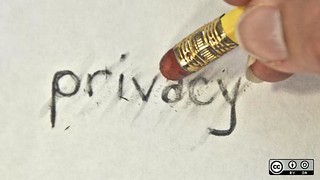
At last week’s Fiesole Retreat in Cambridge, England, Clifford Lynch gave an interesting and thought-provoking talk about what he called the ‘simmering’ issues – issues that aren’t at the top of anyone’s list of priorities right now, but that could well be in the near future. The three he identified were privacy, trust (especially in terms of reproducibility), and – this being primarily a librarian meeting – the challenge of managing the popular culture record in a digital age.
Concerns about privacy are certainly nothing new in the wider public domain – they’ve been dominating the headlines for the past year or so following Edward Snowden’s revelations about the NSA, most recently with the award of this year’s Pulitzer Prize for Public Service to The Guardian and the Washington Post for their coverage of the story. But privacy in scholarly communications has not been examined in great detail as far as I know, and Lynch’s discussion of getting the right balance between adding value through the data we collect (whether as publishers, libraries, societies, or funders) and being “downright creepy”, was well made.
For example, how much information should we be sharing with our authors? There’s no doubt that many of them would likely welcome more – and more granular – data on who is reading their books and articles, which bits are getting most read (or where people stop reading), etc. But would we want to give authors information that enables them to actually identify – and perhaps contact – their readers directly? Probably not, but as Lynch pointed out, that’s the sort of thing that Amazon could conceivably offer as an incentive to persuade authors to self-publish with them. And for some authors, it could work. In some countries and regions, data protection legislation is in place that determines what information is available to whom. But where that isn’t the case, what role should publishers play in protecting the privacy of our readers and users? If one of the societies we partner with for publishing services wants more detail about how their members are using society content online, how much should we share?
Trust is increasingly less of a simmering issue and more of a burning one. This year’s UKSG included an excellent panel discussion on Trust, Impacts, and Workflows, including a presentation from Carol Tenopir and David Nicholas on their recent survey on trust in scholarly communications, also covered here. Lynch’s main concern here was around reproducibility, which has had less coverage but is starting to bubble up as an issue. (However, as David De Roure of Oxford University noted in yesterday’s UKSG plenary, we need to remember that reproducing an experiment is not the same as reconstructing it, which has much less value.) Lynch was especially interested in the role of peer review in ensuring reproducibility – a topic which should be of great concern to all of us, as we think about what we really want from the peer review process in our digital world, and consider what changes are needed to our current processes to ensure that peer review continues to be fit for purpose.
Preserving the popular culture record is not something that I’ve given much thought to, other than to idly wonder how – despite the plethora of opinions many of today’s thinkers and influencers express online – future scholars will ever know what they thought and said in private. The British Library’s collection of written documents and manuscripts – from marked up versions of Dickens’ novels to original Beatles music – gives us a fascinating glimpse into the creative process, both from a social and a scholarly perspective. Will that be possible for scholars looking back at popular culture in the twenty-first century and beyond? As Lynch pointed out, although not scholarly themselves, these materials are of vital importance to scholars and need to be protected and preserved. To quote him, “We know we’re in deep trouble, but we don’t know how deep it is.” Is there perhaps an opportunity for publishers, societies, and libraries to work together to create solutions that ensure future generations have access to these important materials?
There are surely many other simmering issues out there. Having thought about this in the few days since Lynch’s presentation, a couple are now on my radar, namely: the future allocation of APC funding at institution level (not apparently an issue yet, but as more journals offer this option and more authors want or are mandated to publish gold, it can’t be long); and content neutrality of discoverability systems (not something I was aware of until recently, but which has significant implications for libraries, publishers, and researchers). Which issues are currently bubbling below the surface that you are watching and worrying – or indeed getting excited – about?
Discussion
10 Thoughts on "The Next Big Things?"
Predicting emerging issues is always speculative in a changing environment. With the US Public Access program only mandating delayed subscription access it is not clear that APC mandates will become widespread. The UK bet on US help with APC mandates, and lost.
The biggest mandate issue that I see coming is variable embargo periods. It is a very difficult issue, both politically and technically. The US Federal funding agencies do not want to touch it.
The potential (tectonic) shift away from preserving the formal western paradigm of ideas is fascinating. As emerging economies move from adopting western forms to re-asserting or re-interpreting their own cultural identities there will surely be innumerable important moments to capture as the ‘global social record’ over the next ten years. Certainly both the depth and breadth will be staggering and the question may be whether National institutions and boundaries can seek to do this alone.
The prediction of staggering changes in the next ten years is certainly interesting, however I see no evidence to support it. But then I do not know what you mean by the western paradigm of ideas. Science does not vary that much from country to country, except that certain countries tend to specialize in certain subfields. All journal articles read pretty much the same way. Reasoning is a human trait, not a national or a regional trait.
By a western paradigm of ideas I mean that research is often regarded as a translation into a form of language (often scientific English..). These written ‘findings’ are given recognition as ‘knowledge’ by western systems through Universities and research institutions and the researchers awarded appropriately through patents, prizes and promotions. But many of the originators of knowledge – eg elders in indigenous communities – are often disregarded in terms of their equivalence. However there is substantial work to readdress this and to more directly see systems of knowledge formation outside the western norm as equivalent and relevant to addressing global challenges.
The next big thing may well be the evolution of the scholarly record from traditional articles and monographs to texts, data, software, social comments, etc. … and to not all at the publisher’s site or a library site but dispersed across the internet in specialized service providers. An interesting presentation on this topic at Cliff Lynch’s CNI Spring Meeting by Brian LaVoie of OCLC: “The Evolving Scholarly Record: Scope, Stakeholders, and Stewardship”.
http://www.slideshare.net/oclcr/esr-cni2014
Is it the next big thing…or are we already making that shift? I’d argue the latter.
I just wanted to point out that you listed the NYT as the recipient of the Pulitzer Prize for Public Services, but it was actually the Washington Post.
Alice, the privacy implications you bring up are important and very timely.
As our company and others push towards increased transparency around various metrics for readership, use of scholarship, etc, there’s a good amount of pushback on the subject of privacy. What does it mean to have a service aggregate public tweets, etc when many people intended to share them only w/ people they know (assuming they’d be lost in the digital crowd)? Or for their readership history to be shared publicly?




